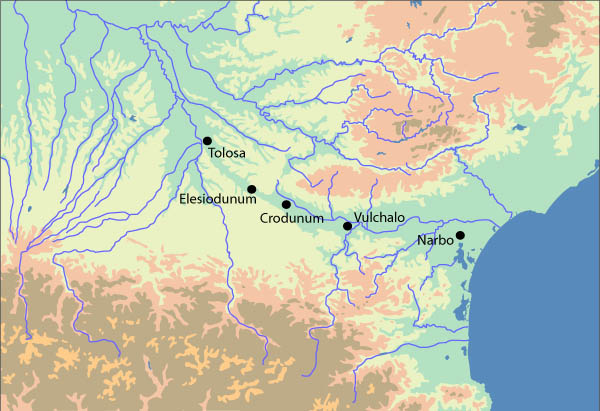- Glass Making in Roman Times
- Roman Wine: A Window on an Ancient Economy
- Roman Wine: Windows on a Lifestyle
- Fine Glassware in the Roman World
- Reuse of Images in the Art of Rogier van der Weyden
The Crimen Vinarius

“For indeed if Marcus Fonteius must be assumed to be guilty because the Gauls assert him to be so, what need pray, for a wise jury, an impartial president, an advocate not without intelligence?” (Cicero, On Behalf of Fonteius IX.19)
The crux of the charge of crimen vinarius laid against Marcus Fonteius was that, while he was governor (praetor) of Gallia during the years 7573 B.C.—then only the region of Gaul south of the Alps—he arranged for a "transit tax" to be levied on each amphora of imported wine at various stages of its transportation inland from Narbo (modern Narbonne):
at Vulchalo (modern Carcassone), 2 victoriati [= 1 denarius];
at Crodunum (modern Castelnaudery), 3 victoriati [= 1.5 denarii]
and at Tolosa (moderne Toulouse), 4 denarii.
These places were Roman garrisons. A merchant who diverted some of the wine through Elesiodunum (modern Montferran) to "the enemy"—most likely the Ruteni tribe—was taxed at 6 denarii per amphora. The profits from both of these ventures would have been huge.
The charge was grave since it alleged a taxation on Rome's own produce, and judging from the number of Gauls who bore witness against him, it is quite possible that Fonteius was guilty. But Rome's foremost lawyer, Marcus Tullius Cicero, gained Fonteius' acquittal by unashamedly appealing to Roman prejudice against the Gauls, who traditionally were regarded as liars and drunkards.
